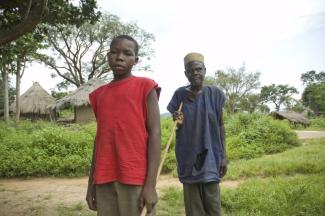Neglected tropical diseases
Networking instead of silo mentality

Twenty diseases are classed by the World Health Organization (WHO) as NTDs (see D+C/E+Z e-Paper 2016/11, p. 14). The most widespread are river blindness, trachoma, elephantiasis, worm infections and bilharzia. Worldwide, more than 1.5 billion people are directly affected by NTDs. Up to half a million a year die as a result.
The term “neglected tropical diseases” underlines the fact that the main risk groups are in developing countries. Women, children and people with disabilities are most affected. So NTDs are diseases of neglected people. At the same time, they are themselves neglected, because for a long time there was very little money available for research and treatment.
In the meantime, numerous programmes have been launched worldwide by a broad-based NTD community of NGOs, pharmaceutical companies and government agencies. Scientists at many institutes are pursuing NTD-related lines of research. What is still lacking, however, is better coordination with programmes in other areas.
The commitment to strengthening health systems, which was a priority of the German G20 presidency in 2017, should particularly go hand in hand with the fight against NTDs. That is the conclusion reached by the German network against neglected tropical diseases in a study presented at a CBM (Christoffel-Blindenmission) conference at the end of November in Berlin. The experts present agreed that it is not enough just to develop and make available new pharmaceutical products. An infrastructure needs to be created for distributing medication at the local level. Jürgen May of the Bernhard Nocht Institute for Tropical Medicine in Hamburg says: “In some remote areas it is easier to get a cold cola than medicine.”
To control NTDs permanently, a comprehensive health-care delivery system needs to be created. This must deliver not just effective and affordable medicines but above all health-care centres staffed by trained professionals, free treatment and, last but not least, public awareness campaigns on the causes and prevention of NTDs. It is important that health-care services should be genuinely accessible to everyone. Toyin Aderemi-Ige, who heads the CBM country office in Nigeria – the country with the highest NTD infection rate in Africa – and is herself a wheelchair user, knows from personal experience that people with disabilities are still far too often excluded. “The problem needs to be tackled from different angles,” she says.
For example, risk of infection and disease is lowered by a comprehensive supply of clean water and improvements in hygiene standards. Conversely, NTD control measures help strengthen developing countries’ health-care systems by getting urgently needed basic services to even the remotest areas. And the construction of wells improves not only hygiene but also the nutrition of local communities and thus makes a broad-fronted contribution to the prevention of disease.
Coordinating policies across the various sectors is not just a constructive move for strengthening health-care systems and developing hygiene programmes. The authors of the study also cite poverty reduction, food security, climate-change mitigation and gender equality as important elements of integrated NTD work. They argue that anyone who works against inequality should also fight against neglected tropical diseases. That is the only way to stop NTDs being the diseases of neglected people.
Link
Kickbusch, I., and Franz, C., 2017: Die integrierte Umsetzung der Bekämpfung der vernachlässigten Tropenkrankheiten – Potential Deutschlands. (In German)
http://www.dntds.de/de/aktivitaeten-details/deutschlands-potential-bei-der-bekaempfung-von-vernachlaessigten-tropenkrankheiten.html







